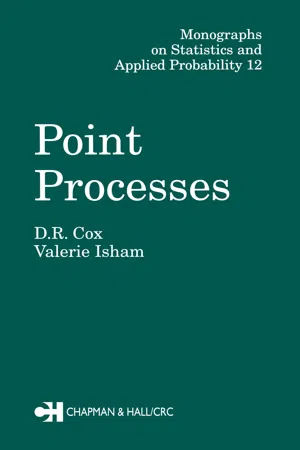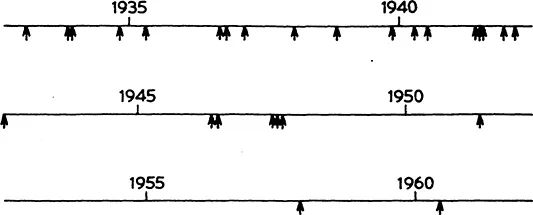
- 188 pages
- English
- ePUB (mobile friendly)
- Available on iOS & Android
eBook - ePub
Point Processes
About this book
There has been much recent research on the theory of point processes, i.e., on random systems consisting of point events occurring in space or time. Applications range from emissions from a radioactive source, occurrences of accidents or machine breakdowns, or of electrical impluses along nerve fibres, to repetitive point events in an individual's medical or social history. Sometimes the point events occur in space rather than time and the application here raneg from statistical physics to geography. The object of this book is to develop the applied mathemathics of point processes at a level which will make the ideas accessible both to the research worker and the postgraduate student in probability and statistics and also to the mathemathically inclined individual in another field interested in using ideas and results. A thorough knowledge of the key notions of elementary probability theory is required to understand the book, but specialised "pure mathematical" coniderations have been avoided.
Tools to learn more effectively

Saving Books

Keyword Search

Annotating Text

Listen to it instead
Information
CHAPTER 1
Introduction
1.1 Preliminary remarks
This book deals with a particular kind of random process. The central idea is to study random collections of point occurrences. For the most part we consider the points as occurring along a time axis, although later we do allow other possibilities, for example that the points occur in some region of space.
A few outline examples illustrate the breadth of potential applications:
(i) emissions from a radioactive source occur in an irregular sequence in time, each emission defining a time instant;
(ii) Fig. 1.1 shows a small section of a time series of electrical energy in a nerve fibre. The occurrences of peaks define a sequence of points in time. If attention is concentrated on this sequence of time points, rather than on the magnitudes of the peak signals, we have a point process derived from a more complicated process;

Fig. 1.1 Electrical signal in nerve fibre. ↑, points ofassociated point process.
(iii) Fig. 1.2 shows part of the sequence of dates of coal-mining disasters in Great Britain for 1851-1975, a disaster being defined as involving the death of 10 or more men;

Fig. 1.2 Coal mining disasters in U.K. killing 10 or more. Extractfrom larger set of data (Jarrett, 1979). ↑, times of disasters.
(iv) in road traffic studies, we may consider the sequence of time points at which vehicles pass a reference point. Alternatively, if we examine a length of road at one fixed time instant and regard the position each vehicle as specified by a point, e.g. by the position of its front wheels, we have a point process in one-dimensional space, rather than in time;
(v) many of the stochastic problems of operational research involve a point process. The instants of arrival of customers in a queue, the instants of withdrawal of items from a store, and the instants of failure of a component in some system are all examples;
(vi) in several of these examples, each point may be classified into one of several different classes or types. For example, in (iv), we may distinguish two classes, cars and lorries. In a queueing problem, (v), there may be several types of customer; alternatively, we may wish to consider both customer arrivals and customer departures as points, but as points of two different types. A point process like this in which several classes of point are distinguished is called multivariate;
(vii) point processes occurring along a single dimension in space rather than in time occur, for example, in plant ecology, when a line transect is taken in a field and the position along it of plants of a particular species is noted. Such applications give rise also in an obvious way to point processes in spaces of two or more dimensions.
There are three broad aspects to the theoretical study of point processes:
(a) the general theory, with particular stress on generality of formulation and on the exploration of conditions for existence and uniqueness of the various functions associated with the process;
(b) the study of special processes of potential importance in applications, including the derivation of techniques for investigating such processes assuming reasonably ‘good’ behaviour of all properties studied;
applications, including the derivation of techniques for investigating such processes assuming reasonably ‘good’ behaviour of all properties studied;
(c) the development of techniques for the statistical analy...
Table of contents
- Cover
- Title Page
- Copyright Page
- Table of Contents
- Preface
- 1 Introduction
- 2 Theoretical framework
- 3 Special models
- 4 Operations on point processes
- 5 Multivariate point processes
- 6 Spatial processes
- References
- Author index
- Subject index
Frequently asked questions
Yes, you can cancel anytime from the Subscription tab in your account settings on the Perlego website. Your subscription will stay active until the end of your current billing period. Learn how to cancel your subscription
No, books cannot be downloaded as external files, such as PDFs, for use outside of Perlego. However, you can download books within the Perlego app for offline reading on mobile or tablet. Learn how to download books offline
Perlego offers two plans: Essential and Complete
- Essential is ideal for learners and professionals who enjoy exploring a wide range of subjects. Access the Essential Library with 800,000+ trusted titles and best-sellers across business, personal growth, and the humanities. Includes unlimited reading time and Standard Read Aloud voice.
- Complete: Perfect for advanced learners and researchers needing full, unrestricted access. Unlock 1.4M+ books across hundreds of subjects, including academic and specialized titles. The Complete Plan also includes advanced features like Premium Read Aloud and Research Assistant.
We are an online textbook subscription service, where you can get access to an entire online library for less than the price of a single book per month. With over 1 million books across 990+ topics, we’ve got you covered! Learn about our mission
Look out for the read-aloud symbol on your next book to see if you can listen to it. The read-aloud tool reads text aloud for you, highlighting the text as it is being read. You can pause it, speed it up and slow it down. Learn more about Read Aloud
Yes! You can use the Perlego app on both iOS and Android devices to read anytime, anywhere — even offline. Perfect for commutes or when you’re on the go.
Please note we cannot support devices running on iOS 13 and Android 7 or earlier. Learn more about using the app
Please note we cannot support devices running on iOS 13 and Android 7 or earlier. Learn more about using the app
Yes, you can access Point Processes by D.R. Cox,Valerie Isham in PDF and/or ePUB format, as well as other popular books in Mathematics & Probability & Statistics. We have over one million books available in our catalogue for you to explore.